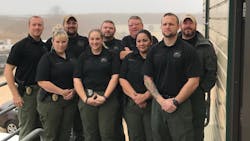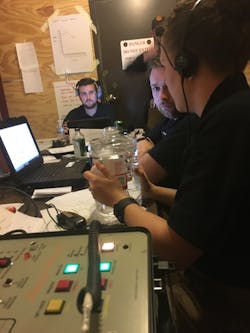Law Enforcement Train For A Crisis
Dr. Wayman Mullins of Texas State University and the coordinator for the event says the conference is the second oldest of its kind in the country. “The first day is spent on classroom training with skill building and debriefing,” he says. The last two days of seminar are spent going over practice hostage situations as part of a competition. Mullins says each scenario is written around a situation that could happen in reality. Additionally, the competition covers intelligence practice and training consisting of video interviews. “We had 300 negotiators from 28 teams during this last event,” he says. Teams came from Texas, other states in the country, and from as far as Singapore.
Experts are brought in to teach and provide input and advice to negotiators. There are 30 to 35 judges who evaluate the competing teams. Using standardized forms that have several categories competitors are scored on, judges can provide written comments filled with advice for the negotiators such as their communication skills, use of intelligence, and other related skills—and the teams are able to take the written advice home, allowing them to work on and improve their skills in the field. “Each category in the event is scored based on three positive aspects and three aspects that could be approved upon,” says Mullins. During the event, each person on each team has a specific assignment or role in the scenario.
The Lubbock Police Department (LPD, Texas) has participated in the event in 2017 and 2018. In order to prepare for the event, Detective Keith Anguish says the team prepares for it as if they are responding to a normal callout. “We set up a lot of practice [scenario] calls and active listening skills,” he says. Each team member is assigned a particular role to play during the competition.
The Cedar Park Police Department (Texas) was one of the participants and winner of the 2018 event. In order to prepare, the team from Cedar Park PD trains continually. “Our Central Texas Regional SWAT Crisis Negotiation Team trains on a consistent basis and prepared for this event specifically by conducting multiple role-play training exercises, staying up-to-date on issues affecting members of our citizenry, and engaging in team-building exercises,” says Lieutenant Chanse Thomas.
Practice. Practice. Practice.
The conference benefits officers due to the extensive training and gives access to prestigious trainers, too. “The staff at Texas State University who work with the ALERRT Center (Advanced Law Enforcement Rapid Response Training) and TAHN (Texas Association of Hostage Negotiators) to put this event together, is top-notch,” says Thomas. The event is an ideal way for teams to practice and learn how to enhance their knowledge. Thomas says a tremendous facility large enough to house several teams at once is provided.
Detective Corporal Bryan DuBois, a past participant from the LPD, says since detailed, reality-based training is not always feasible to conduct at home, the hostage negotiator conference is beneficial. The event allows the entire team to practice a real-world challenge or incident with their equipment.
Additionally, the positive and negative feedback from expert judges may be applied to the team in regard to areas that could be rethought or worked on in future training. DuBois says the LPD team learned to ensure that any breaks in conversation are thoroughly utilized to keep the team focused. “This way we can steer the conversation so that when we start back negotiating, we do not lose ground but have been able to make logical plans to move the conversation to where we believe it needs to go.”
In addition to learning more regarding crisis and hostage negotiation, the event is an excellent opportunity for sharing tips, information and networking with other agencies. Thomas says teams are able to network with contacts they can reach out to in the future for assistance. “This event is the best negotiation competition in the country and it allows teams from all over the nation to come together to share ideas, share experiences and learn from one another on how to be more efficient and effective,” says Thomas. The event is open to any negotiation team that may want to sign up. There are a limited number of teams that may register due to the amount of resources available. Early registration is encouraged.Trends lead to enhanced training
Mullins says the situations crisis negotiators encounter over the years involve high risk suicide situations and domestic violence the most. The recent events of active shooters, however, have increased the need for tactical negotiation.
There is also an issue with increased technology usage by the suspect. “I think a real issue that negotiators are facing is the concept of social media and the use of smartphones,” says DuBois. “Social media has become normal and is now allowing the subject to keep up with news feeds, texting and even live streams of what he or she wants to tell people rather than focusing on the dialogue that we as negotiators are trying to obtain.” As a result, the subject can often use a variety of sources that allow them to reach out to family and friends, potentially interfering with the negotiation conversation.
Detective Anguish says social media and cell phones in general interfere. “Communications can be derailed by consistent interruption from both of these,” says Anguish. By recognizing the situations and elements that may interfere with effective negotiation, teams can focus on ways to troubleshoot these situations. High quality training such as the Crisis and Negotiation Competition and Seminar allows personnel to do just that.

Hilary Rodela
Hilary Rodela is currently a Surveillance Officer, a former Private Investigator, a former Crime Scene Investigator, and Evidence Technician. She worked for the Ruidoso (NM) Police Department as well as the Lubbock (TX) Police Department. She has written for several public safety publications and has extensive law enforcement and forensic training and is pursuing forensic expertise in various disciplines. Hilary is a freelance public safety writer and curriculum developer for the National Investigative Training Academy.




